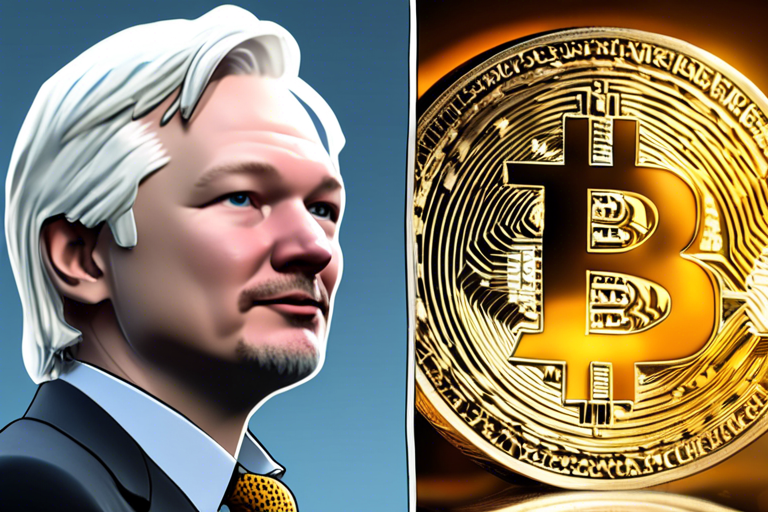Summary of Julian Assange’s Journey to Freedom
Julian Assange, founder of WikiLeaks, is set to return to Australia after reaching a plea agreement with the U.S. authorities and receiving a generous donation from an anonymous Bitcoin contributor. This donation nearly covered the costs of his charter flight from Saipan to Australia, allowing him to avoid further imprisonment in the U.S.
Anonymous Bitcoin Donation for Julian Assange
- An anonymous Bitcoin donor gave about $500,000 (8 BTC) to cover Julian Assange’s travel expenses.
- Assange pleaded guilty to one charge of breaching the Espionage Act in the U.S. District Court in Saipan.
- The donation almost met the $520,000 appeal for Assange’s charter flight costs to Saipan and Australia.
- Assange was released after being sentenced to time already served and can now return to Australia.
- WikiLeaks has a history of using Bitcoin for donations after facing blocks from traditional payment processors in 2010.
Julian Assange, known for his controversial website WikiLeaks, is finally free after 14 years of legal battles related to his extradition to the United States. His release followed a plea deal with U.S. authorities and a substantial donation from an anonymous Bitcoin benefactor.
Assange, who had been detained at the high-security Belmarsh prison in the UK, was able to leave prison and travel to Saipan, a territory of the United States, where he appeared in court and admitted to breaching the Espionage Act.
Despite being sentenced by the U.S. District Judge, Assange had already served the equivalent time in the UK while fighting extradition. This allowed him to walk out of the courtroom as a free man, avoiding further incarceration in the U.S.
Generous Bitcoin Donation for Assange’s Flight Costs
- Assange’s wife started a crowdfunding campaign to cover the $520,000 debt for a charter flight to Saipan and Australia.
- An anonymous Bitcoin donor contributed over 8 Bitcoin, nearly fulfilling the entire fundraising goal of $520,000.
- The use of Bitcoin showcases its role in supporting causes that may face challenges from traditional financial systems.
- WikiLeaks began accepting Bitcoin donations in 2010 after being blocked by mainstream payment processors like PayPal and MasterCard.
The journey to freedom for Assange came at a significant cost, with his wife revealing the hefty charges for the charter flight. However, an anonymous Bitcoin donor stepped forward and contributed a substantial amount, covering a significant portion of the total expenses.
Within hours of launching the donation link, the individual donated over 8 Bitcoin, valued at around $500,000. This single contribution exceeded all other donations combined and brought Assange closer to covering his travel costs.
The use of Bitcoin in this context illustrates its potential as a tool to support causes that may struggle to access traditional financial avenues. WikiLeaks and Assange have a history of involvement with cryptocurrency, showcasing its role in facilitating freedom of speech and funding for controversial entities.
Assange’s Return to Australia Debt-Free
- Assange boarded a private plane to Canberra, Australia, with contributions totaling over £300,000 ($380,000), in addition to the Bitcoin donation.
- This marks the conclusion of a lengthy legal battle for Assange, who has been both celebrated and criticized for his actions related to WikiLeaks.
- As part of his plea deal, Assange must acknowledge the legality of soliciting classified information for publication and destroy all classified data shared with WikiLeaks.
Following his court appearance in Saipan, Assange embarked on a flight to Australia, thanks to the combined contributions from donors. With the assistance of the Bitcoin donation and additional fiat currency funds, Assange is likely to arrive in Australia without any outstanding debts, marking the end of a decade-long legal saga.
Hot Take: Reflections on Assange’s Journey
Julian Assange’s recent developments underscore the intersection of technology, justice, and freedom of speech. His reliance on Bitcoin for critical financial support highlights the evolving role of cryptocurrency in facilitating controversial but essential causes. This saga serves as a testament to the power of decentralized systems in challenging traditional structures and supporting individuals in their pursuit of justice and transparency.





 By
By
 By
By
 By
By

 By
By
 By
By